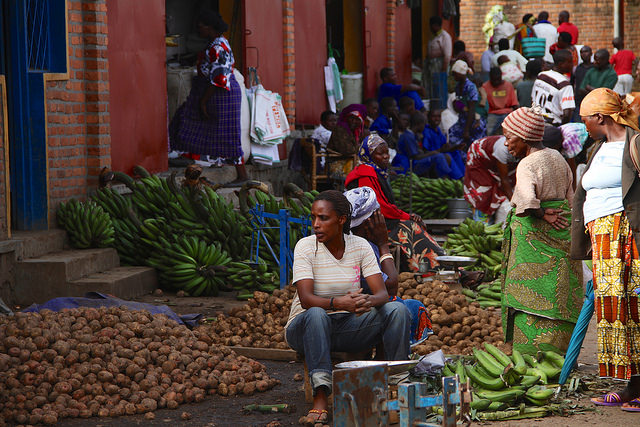Ten years after its establishment, the IFPRI-facilitated Regional Strategic Analysis and Knowledge Support System (ReSAKSS) in Africa serves as a vital support to the implementation of the Comprehensive Africa Agriculture Development Programme (CAADP)—a growth-oriented agricultural development agenda. On October 18-20, IFPRI, in partnership with the African Union Commission (AUC), convenes the 2016 ReSAKSS Annual Conference in Accra, Ghana for stakeholders to review and engage in a dialogue on the CAADP implementation. The theme of the conference is “Achieving a Nutrition Revolution for Africa: The Road to Healthier Diets and Optimal Nutrition.”
ReSAKSS was created in 2006 to provide the necessary data, knowledge products, and capacity building for improved policy and investment decisions to achieve goals set by the Maputo Declaration: 10 percent of public spending invested in agriculture and 6 percent agricultural GDP growth rate in African countries. ReSAKSS agricultural growth and investment analyses for poverty reduction have informed CAADP dialogues, roundtables, country compacts, and national agriculture investment plans. To date, 80 percent of African Union member states and 4 regional economic communities have signed CAADP compact agreements containing specific commitments, and 60 percent of countries are implementing investment plans to help to meet the targets.
To help transform commitments into tangible results, ReSAKSS facilitates the establishment of sound monitoring and evaluation at the regional and national level. Since 2007, ReSAKSS has been publishing the Annual Trends and Outlook Report, which serves as the official CAADP monitoring and evaluation report. More recently, ReSAKSS worked with the AUC and the New Partnership for Africa’s Development (NEPAD) Planning and Coordinating Agency to develop the CAADP Results Framework 2015-2025: Going for results and impacts, which is designed to track progress in meeting the expanded targets set by the Malabo Declaration, including specific nutrition goals, by 2025. At the country level, ReSAKSS has helped 15 countries establish Strategic Analysis and Knowledge Support Platforms to inform policy and program planning and implementation using local expertise and data and analytical products. ReSAKSS also provided support to 30 countries to adopt comprehensive, inclusive, and technically robust joint sector reviews (JSRs)—an assessment of the agricultural sector’s and key stakeholders’ performance.
Moreover, ReSAKSS provides valuable capacity strengthening support to ministries of agriculture, country CAADP teams, national statistics offices, universities, and the private sector. In 2015, ReSAKSS organized 17 methodology and technical training workshops on agricultural policy analysis, geographic information systems, and CAADP monitoring and evaluation for 364 participants from East and Central Africa, West Africa, and Southern Africa regions; 23 percent of the participants were female. In 2016, ReSAKSS, in collaboration with CAADP teams, developed 21 country eAtlas platforms that allow countries to disaggregate and track hundreds of indicators at the local level, facilitating the prioritization and targeting of policies and programs.
In the past 10 years, ReSAKSS has successfully promoted evidence-based policies and strategies under CAADP. According to the United States Agency for International Development’s Final Performance Evaluation Report of the Regional Strategic Analysis and Knowledge Support System (ReSAKSS), “ReSAKSS is providing the right kind and level of information to support CAADP processes.” The work ReSAKSS contributed helped countries that adopted CAADP early achieve a 6-7 percent rise in agricultural productivity per year and 1.8 percent average annual increase in agriculture expenditure from 2003 to 2014, based on the Alliance for a Green Revolution in Africa’s 2016 African Agriculture Status Report.
Janna de la Paz is a Program Analyst at IFPRI.
To view/download/print a PDF of this post, click here. For more Outcome Stories, see the Outcome Stories blog.







